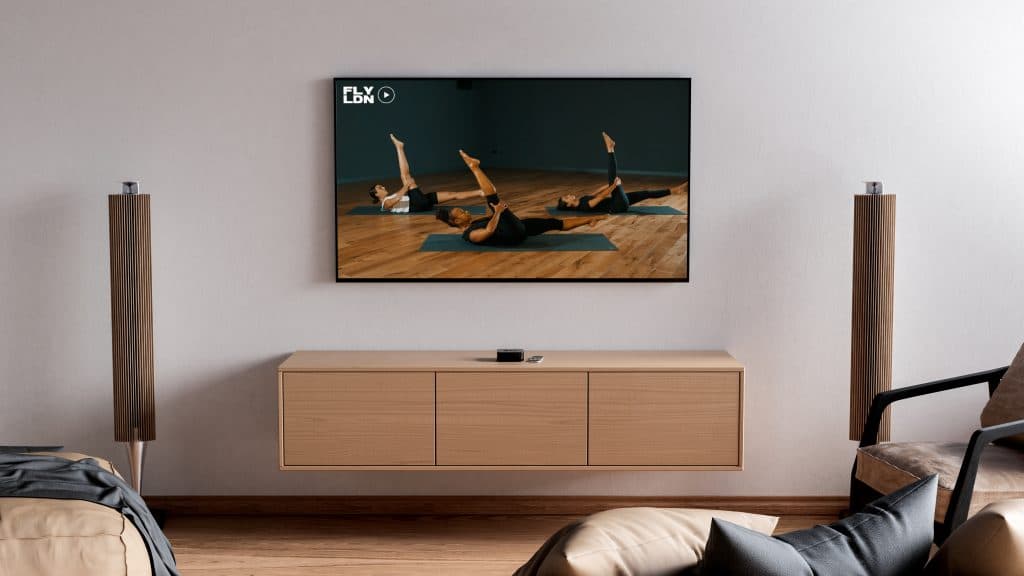Sponsored by Fly LDN
The past decade has witnessed significant shifts in the way that fitness is consumed in the UK & across the globe. The events of 2020 accelerated the trend for digital fitness, creating a range of new market opportunities for challenger brand FLY LDN.
The fitness industry has changed
Since 2010, the UK fitness industry has seen a bifurcation. The growth of the economy gym sector (operators such as Pure Gym, Anytime Fitness) and the premium boutique sector caused a significant squeeze in the mid-market (operators such as Virgin Active, Fitness First).



Boutiques focus on providing a class-based luxury consumer experience in design-led studios with highly specialised class concepts and a high quality of instruction. The boutique price point reflect this, with consumers typically paying between £15 and £23 per class. Monthly memberships are declining with payment per class becoming the accepted pricing model, allowing consumers the flexibility to fit their exercise regime around different product offerings.
London (following the trend in New York, LA and other major US cities) has been the epicentre of the development of the UK boutique market, with more recent growing penetration across the UK. However, the boutique sector currently represents only 4% of the total UK fitness market (compared with 42% in the US) demonstrating significant growth potential for brands domestically and in even more nascent international markets.



HIIT (high intensity interval training) brands were the earliest movers in the boutique space (Psycle, 1Rebel, Barry’s Bootcamp) and established multi-site chains. In 2017, FLY LDN identified low impact training as the next growth sector in the UK fitness market and saw an opportunity to be the first brand to create a low impact boutique experience around yoga, pilates, barre and low impact strength training.
Low impact exercise, meditation and mindfulness are continuing to make the transition into the mainstream – demonstrated by retail brands which are quicker to produce products in response to market trends and demand (e.g. Nike’s yoga collection and the dominance of yoga-inspired brand, Lululemon).
As the first brand to create a low impact boutique experience, FLY has since built and developed significant platforms tracking the trend towards sustainable training, mindful movement, and body positivity.
FLY seized the opportunity to distinguish itself from high intensity and omnivorous fitness brands by building a clear brand identity based on this kinder, more mindful approach to fitness. The brand is focussed on promoting body positivity, selfcare and sustainable fitness as aspirational.
Since launch, FLY has picked up a slew of awards including ClassPass Instructor of the Year, Men’s Health Studio of the Year, and various awards at the Tatler Gym Awards 2018 and 2019.



FLY LDN is now uniquely placed to amplify its strong following and brand identity online and emerge as a leader in this market segment in person and online.
2020
2020 witnessed an explosion in the digital fitness market. The digital fitness market had been growing organically but COVID and the resulting national lockdowns caused significant disruption in the UK fitness industry, providing a challenge and an opportunity to fitness brands. Those with the strongest brand identity, authenticity and customer engagement grew their franchises during 2020.FLY LDN’s social media following increased 400% in 2020.
This presented an even greater opportunity for UK based fitness brands to participate in this $59bn global industry. As with in person fitness, this new growth market has focussed on price, quality and brand appeal.
FLY LDN seized this unprecedented market opportunity to grow the brand profile by launching FLY LDN Online, offering our premium product online to the mass market at an affordable price point.
Almost immediately it became clear that low impact exercise translated well at home. While indoor cycling brands (e.g. Peloton) have grown their sales multiple times year on year, expensive and space consuming hardware remain high barriers to entry for consumers. Low impact exercise disciplines such as yoga and pilates require little to no equipment, are quiet to perform, and are space efficient. FLY LDN Online saw rapid and significant growth scaling to 2.5 million minutes watchedand users in more than 80 countriesglobally with a customer trial conversion rate of 87%and a retention rate of 78%.
The future
2020 has cemented the role of online subscriptions in people’s lives. In 2020, UK spending on digital and subscription services was up 39% YoY. Each household now has an average of 7 monthly subscriptions.
Temporary closure of physical sites and shifting working patterns have also changed people’s fitness consumption patterns. This trend is expected to largely continue as companies look to more real estate light (capital efficient) and flexible forms of working.
“FLY is the beneficiary of some of the key trends witnessed in 2020. The business has a small real estate footprint and significant brand traction and engagement.
FLY’s focus on low impact exercise forms has translated exceptionally well to the at home market and the quality of its offering alongside a well-calibrated pricing strategy has resulted in market leading customer conversion and retention.
The growth of FLY LDN Online allows FLY to achieve global brand recognition in a capital efficient manner, providing opportunities for complementary revenue streams including e-commerce and franchising.
This is our first public fundraising round and a unique opportunity for us to supercharge our growth and welcome you to our shareholder community.
To invest in us and find out more, head to our Crowdcube campaign.” – FLY founder, Charlotte Cox
